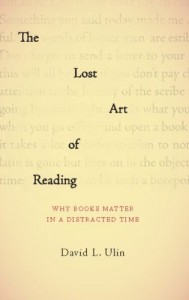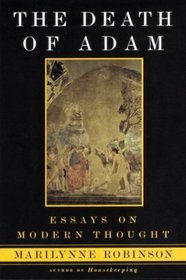The Lost Art of Reading
 David Ulin’s Lost Art of Reading has been a thought-provoking little book. Described as a “ruminative essay,” this compact reflection on the distinctiveness of reading, and its role in an increasingly networked information age, doesn’t really make an argument against technology or predict the death of reading. But it does acknowledge some ways books and reading are being changed by technology, and makes a case for being proactive about finding ways to preserve the immersion act of deep reading.
David Ulin’s Lost Art of Reading has been a thought-provoking little book. Described as a “ruminative essay,” this compact reflection on the distinctiveness of reading, and its role in an increasingly networked information age, doesn’t really make an argument against technology or predict the death of reading. But it does acknowledge some ways books and reading are being changed by technology, and makes a case for being proactive about finding ways to preserve the immersion act of deep reading.
This author has very different tastes in books than I do, and when he talks of his own literary autobiography — his experiences with various books that have shaped him in the course of his life — I’m rarely familiar with the authors and don’t relate very well. But we all have our own stories of books that have been important to us, and experiences of reading that we treasure.
Ulin makes reference to Nicholas Carr’s The Shallows (as well as other sources), a book I read and liked very much last year. But where Carr makes a thorough examination of the effects of the Internet on our brain “circuitry,” Ulin’s focus seems more personal. How should we respond to the distractibility we develop when we spend time online? Ultimately his conclusion is not all that remarkable: “I sit down. I try to make a place for silence. It’s harder than it used to be, but still, I read.” There is a pleasure in the journey, though, as Ulin’s observations about why reading matters, and what we come up against as we seek to get lost in a book, strike many familiar chords. I really liked his analysis of reading on the Kindle, something he has mixed feelings about (as do I). It was an affirming read in this sense.
As I neared the end, I found myself paying closer attention to my own online habits, and it’s not pretty. The main thing I notice is how many times I feel the urge to go to the computer for something, and then I tend to drift out into Internet-land for much longer than I intended. So I started to challenge that urge by setting a time for computer work, closing the laptop, and keeping a notebook and pen close by to write down anything that occurred to me to do online: check the weather; check email; see if Jessie Wise has a 5th grade grammar book coming out; track the packages that should be arriving this week; check on some blogs; visit the IEW website to see if my feelings have changed about that writing program’s approach; blog post ideas; et cetera...
I saved these tasks till the designated time, then sat down with my list. It felt good, and it worked pretty well; I closed the laptop again when I was done. I’m going to keep doing it. (Not even New Year’s yet, and this sounds like a resolution.) It was a small thing, a small boundary, but it helped to keep me more fully available to my offline life, which includes important (loved) people and things to do, along with some drudgery — and some reading time. I used it to finish up this book. I recommend it to anyone who hasn’t read The Shallows. Otherwise, start with that one. Like this one, it’s not a polemic, but it does establish a foundation that makes a more narrowly focused book like this one more meaningful.



4 Comments
Amy @ Hope Is the Word
I like that idea Janet, of keeping an online to-do list and limiting your online time. I’m hoping to make some changes in the new year. ;-)
The book sounds great!
Alice@Supratentorial
That is an excellent idea. I also find that often I go to the computer for quick necessary tasks but then end up on rabbit trails that take me away from other things.
Carrie, Reading to Know
I like that idea as well. I just finished reading Lit! A Christian Guide to Reading Books and he quotes Ulin in The Lost Art of Reading, specifically when speaking of online habits. I (finally!) felt very convicted in this area enough to make a serious change. (The change was coming following your post of a few days back in which you were talking about how it’s more difficult to sit and concentrate on a book given our online tendencies.) Ruminating on all of this. More change to come in 2012! Always growing, I suppose. =)
hopeinbrazil
Sounds like a book worth reading.